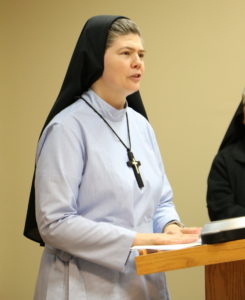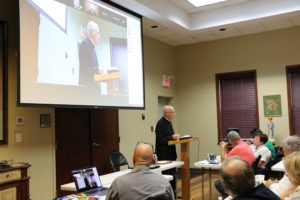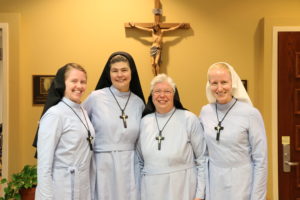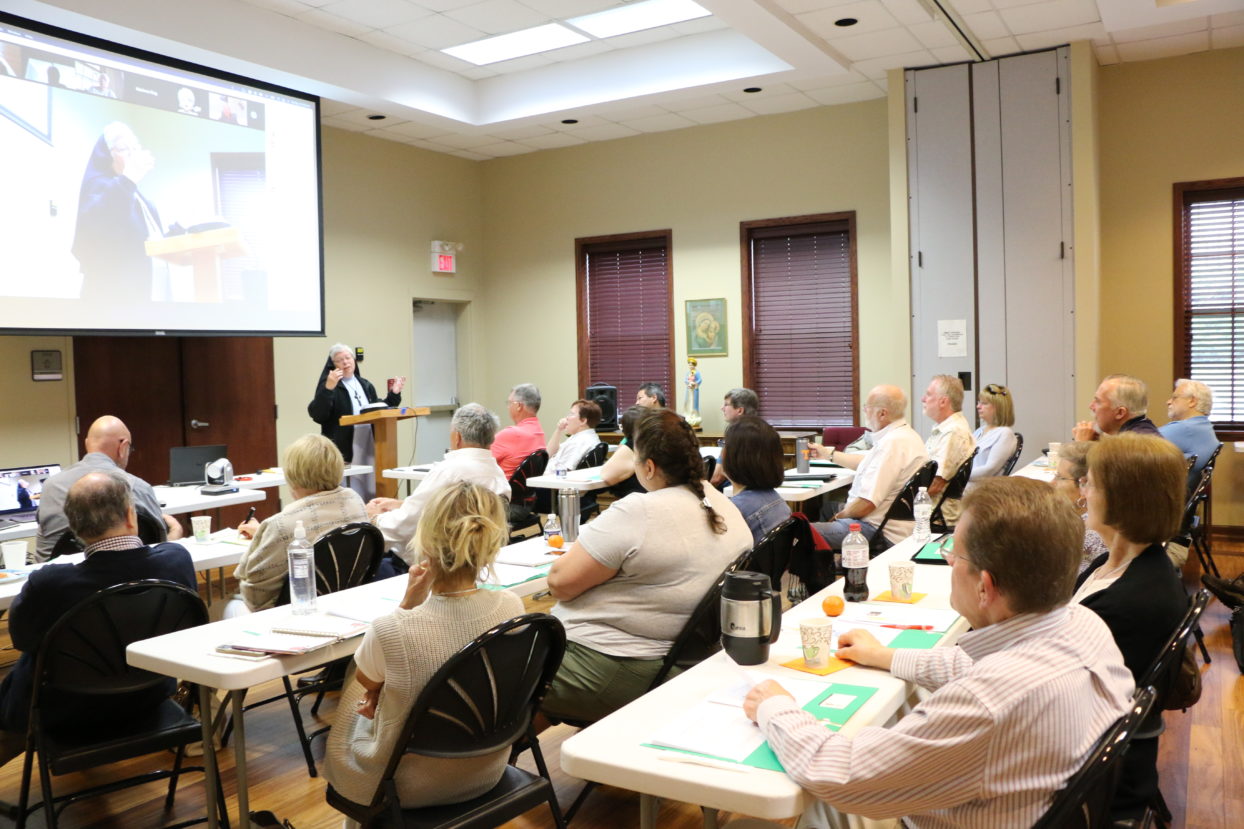Parishes throughout the Diocese of Knoxville strive to form and retain new Catholics
By Gabrielle Nolan
Parish coordinators for the Rite of Christian Initiation for Adults in the Diocese of Knoxville gathered recently for a day-long conference on learning ways to strengthen the Church through RCIA.
“I see the goal as, with these conferences, to help form those who are charged with forming those who are entering the Church,” said Sister Peter Miriam Dolan of the Religious Sisters of Mercy of Alma, Mich. Sister Peter Miriam serves as director of the Office of Christian Formation for the diocese.
Diocesan RCIA coordinators are required to attend at least one conference annually “to help [them] to grow in the faith so that they can be effective, joyful witnesses of the faith that encourages those who are looking to enter into the Church,” Sister Peter Miriam said.

Sister Peter Miriam Dolan, RSM, director of the Office of Christian Formation, opens the RCIA fall conference. More than 40 RCIA leaders attended the conference in person and virtually.
The conference, held Sept. 18 at the Chancery, included guest speakers, time for prayer, a question-and-answer session, as well as group discussions. More than 40 RCIA leaders from around the diocese attended the conference in person and virtually.
“You never stop learning. Every time I’ve come to a conference, I’ve learned something more, always,” said Judy Collins, who has been the RCIA coordinator at Notre Dame Parish in Greeneville for the past 17 years.
The U.S. Conference of Catholic Bishops describes RCIA as a process in which participants “undergo . . . conversion as they study the Gospel, profess faith in Jesus and the Catholic Church, and receive the sacraments….The RCIA process follows the ancient practice of the Church and was restored by the Second Vatican Council as the normal way adults prepare for baptism.”
The three sacraments of initiation in the Catholic Church are baptism, confirmation, and the holy Eucharist. RCIA participants who are unbaptized are referred to as catechumens, while baptized Christians entering into full communion with the Church are referred to as candidates.
For the 2020-2021 year, the diocese had a total of 92 catechumens and 194 candidates, numbers which have remained consistent over the past several years. The numbers are especially significant given COVID-19, which essentially shut down the world in 2020.
“We’ve had as few as one person a year that might have been a catechumen or a candidate,” Mrs. Collins said. “We’ve had as many as 15, but we’re a small parish, so 15 was a lot for us.”
Deacon Butch Feldhaus has been an RCIA coordinator at St. Jude Parish in Chattanooga for more than six years.
“It’s so amazing,” Deacon Feldhaus said. “Sometimes when you do something year after year after year, it gets boring or it gets old. This doesn’t. Every year is different; there’s all these different people who come from backgrounds that you would have never imagined.”
“Every year, I sit back at the Easter Vigil and I watch and I think, ah – if they only knew how much of a difference they made for me,” he added.
Conference guest speaker Sister Moira Debono, RSM, STD, is a sacramental theologian who previously studied in Rome and taught in various seminaries and universities around the United States and Australia.
Her two talks focused on the theology of baptism and the formation of the uncatechized baptized entering into full communion with the Church.
“Baptism is so fundamental… it’s the gateway to all the sacraments,” Sister Moira said. “As we look at baptism, it’s a participation in the paschal mystery.”
Sister Moira taught about the many dimensions of baptism, as well as the effects and gifts of baptism.
“When you don’t know what you’ve received, you can’t use it,” she said. “You have to know what the gifts are and how to use them.
“As a catechist, you’re not a teacher in the same way as a history teacher or a math teacher.… The difference is our baptism has changed us.… There is something different about a baptized person in relation to God than one who is not baptized. You are changed.”

Father Randy Stice, director of the Diocese of Knoxville’s Office of Worship and Liturgy, speaks to RCIA leaders on Pope Francis’ four steps of evangelization.
The second guest speaker of the event was Father Randy Stice, who serves as the director of the Office of Worship and Liturgy for the diocese. He is the author of three books, one of which is titled Understanding the Sacraments of Initiation. And recently he served the USCCB as associate director of the Secretariat of Divine Worship.
His presentation on evangelization and the precatechumenate was based on Pope Francis’ four steps of evangelization, which are steps to welcome, discern, accompany, and integrate.
“One of the things that I think is part of your ministry in RCIA is to recognize and to help the people identify the working of grace in their lives,” Father Stice said to the coordinators. “God may be working in their lives in ways they’re not aware.”
An important reminder for the RCIA coordinators was that each candidate or catechumen has “no strings attached in RCIA” but only freedom, Sister Moira said.
“We go with them as far as they’re willing to go,” Father Stice said. “Jesus gave people the freedom to walk away from Him, but He never walked away.”
Sister Peter Miriam expressed that one of the difficulties of RCIA is keeping new Catholics connected to the Church after their initiation.
“It’s a high percentage of those who enter the Church, they leave, end up leaving the Catholic Church within five years,” Sister Peter Miriam acknowledged.
“I look around the parish today, and I see some really active parishioners, and they’ve gone through RCIA,” Mrs. Collins said. “But then we’ve had our number that have decided that this wasn’t for them. They’d be good Catholics for two or three years and then we’ve never seen them again.”
The Association for Catechumenal Ministry is an organization “founded in 1998 by a group of bishops, priests, and laity” that provides a “communications, resources, and education network for diocesan and parish personnel involved in the work of the catechumenate,” according to its website, acmrcia.org.
In a blog post, the ministry lists five reasons as to why new Catholics leave behind the faith so soon after being received into the Church.
“Not that all of those things are happening [in our diocese], it’s just kind of what an organization nationally identified as some of the key pieces at play for why people end up leaving so quickly,” Sister Peter Miriam explained.
Reason One: People are not brought from their initial motivation to firm conviction.
“You’re not converting because of a concept. It has to be deeper,” Sister Peter Miriam said.
“So, in some sense, they haven’t been properly catechized. So that first zeal, first fervor for wanting to look at something didn’t deepen into a commitment, a conversion, that ‘I believe this,’” Sister Peter Miriam said. “They’ve just kind of been rushed through the process.”
Reason Two: A lack of pastoral care during the neophyte year and beyond.
“It’s such an intense time and experience.… They’re going through RCIA with other people who are in similar situations, and they’re being formed together, and they have this community,” Sister Peter Miriam explained.
Finding themselves as a new Catholic within the parish community “is a challenge,” Sister Peter Miriam said. “How do we better address the needs of those who have entered the Church now that they’re Catholic? What are their needs, how do we keep them coming back? Not keep them, but how do we help them to… engage with that zeal and love, that new zeal that they’ve come to?”
Reason Three: The RCIA team does not adequately represent the makeup of the parish.
“You have people who are involved in RCIA, and usually lots of people are very similar and the same people who volunteer for everything all the time, and so you really connect with them,” Sister Peter Miriam said. “Now you’re plunked into the normal everyday life of the parish, and who are these people?”
Reason Four: They do not become liturgical people.

Sister Peter Miriam Dolan, RSM, second from left, is joined by Sister Joan Miriam Nelson, RSM, left, Sister Moira Debano, RSM, and Sister Mary Luke Feldpausch, RSM, in leading the fall RCIA conference.
“If we don’t really share the faith with people regarding the liturgy and help them to know and understand the beauty of the liturgy, it doesn’t really allow them to go deeper because you just become Catholic in name, in some sense,” Sister Peter Miriam pointed out.
Reason Five: They don’t get the Deposit of Faith delivered to them.
“During the process of RCIA they’re really not given, for whatever reason, the real teaching of the faith,” she noted. “Some of them, if they start to realize what they’ve assented to, they start to realize… ‘I don’t agree with this’ and quickly disappear.”
Aside from new Catholics leaving the Church after RCIA is completed, RCIA coordinators have other ongoing challenges within their program. Such examples include working with a group of individuals who are in different stages of their faith life; small parish programs trying to create community; ensuring candidates and catechumens develop a personal relationship with Jesus and the Church; and the logistics of traveling far distances for diocesan events and Masses.
The RCIA conferences aim to educate, equip, and support parish leaders to best tackle the various concerns and issues regarding their own parish, and teaching the Catholic faith is of the utmost importance to Sister Peter Miriam.
“To come to a deeper understanding and appreciation of that great gift of baptism that we’ve encountered, so that from that place of knowing and understanding our own baptism, we can draw from that and help draw others into that great mystery,” she said.

